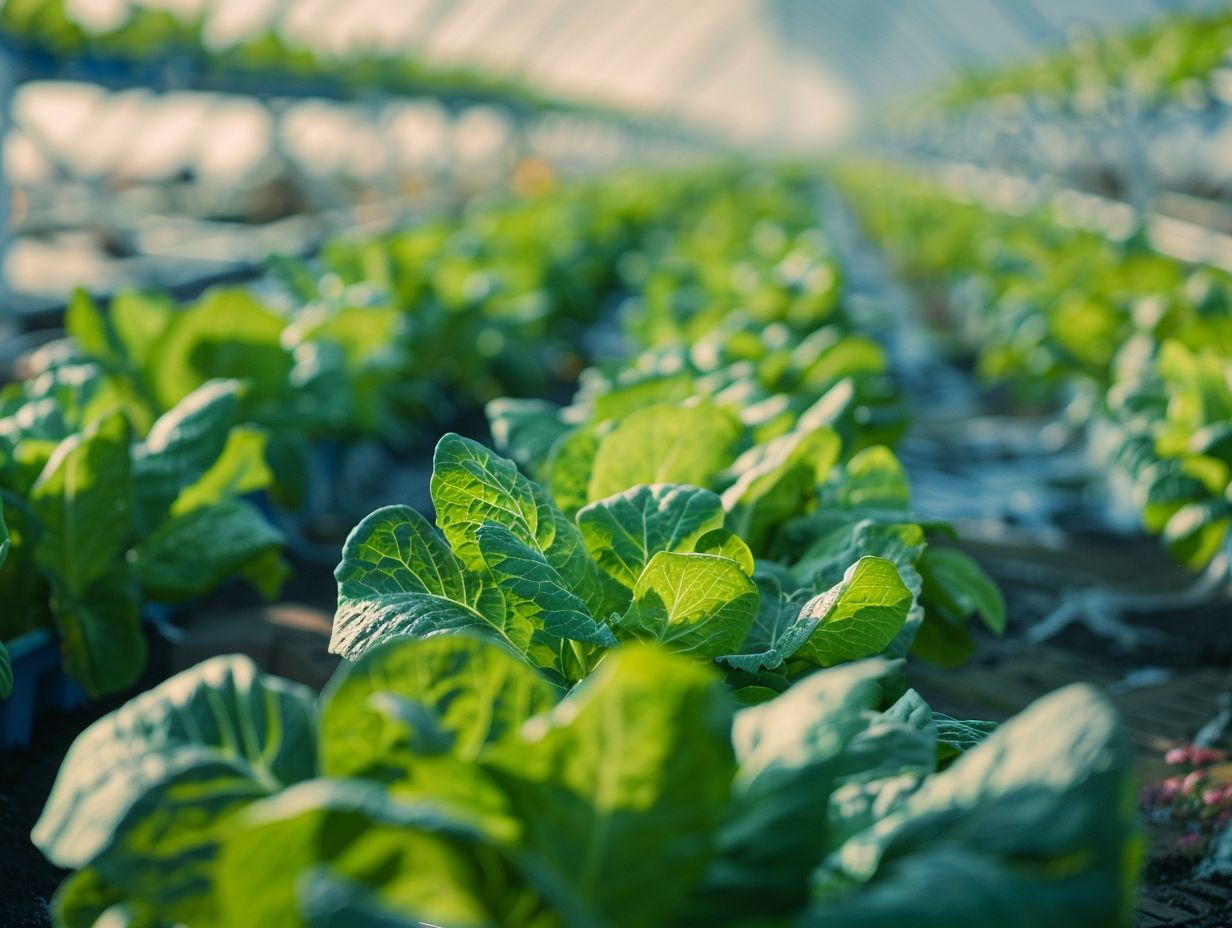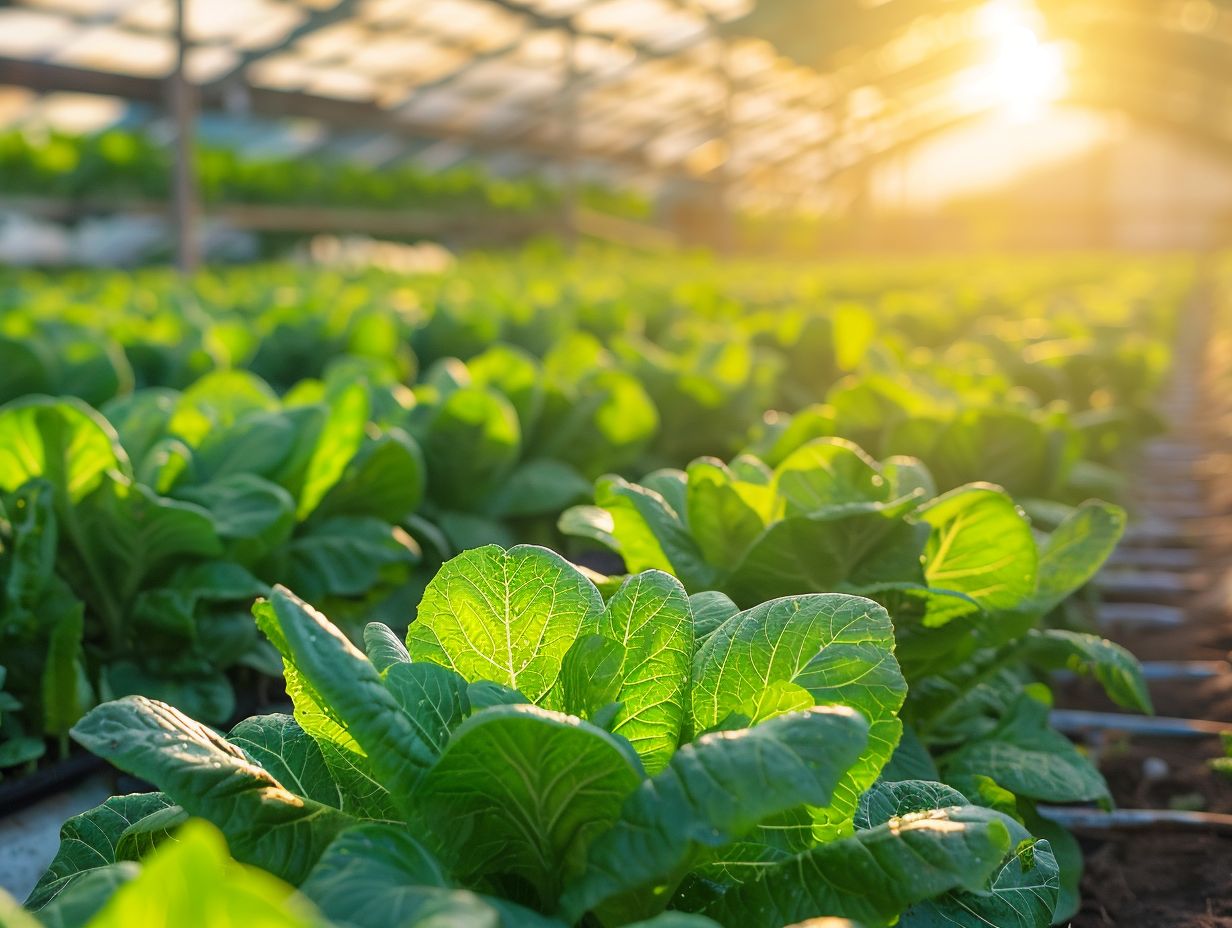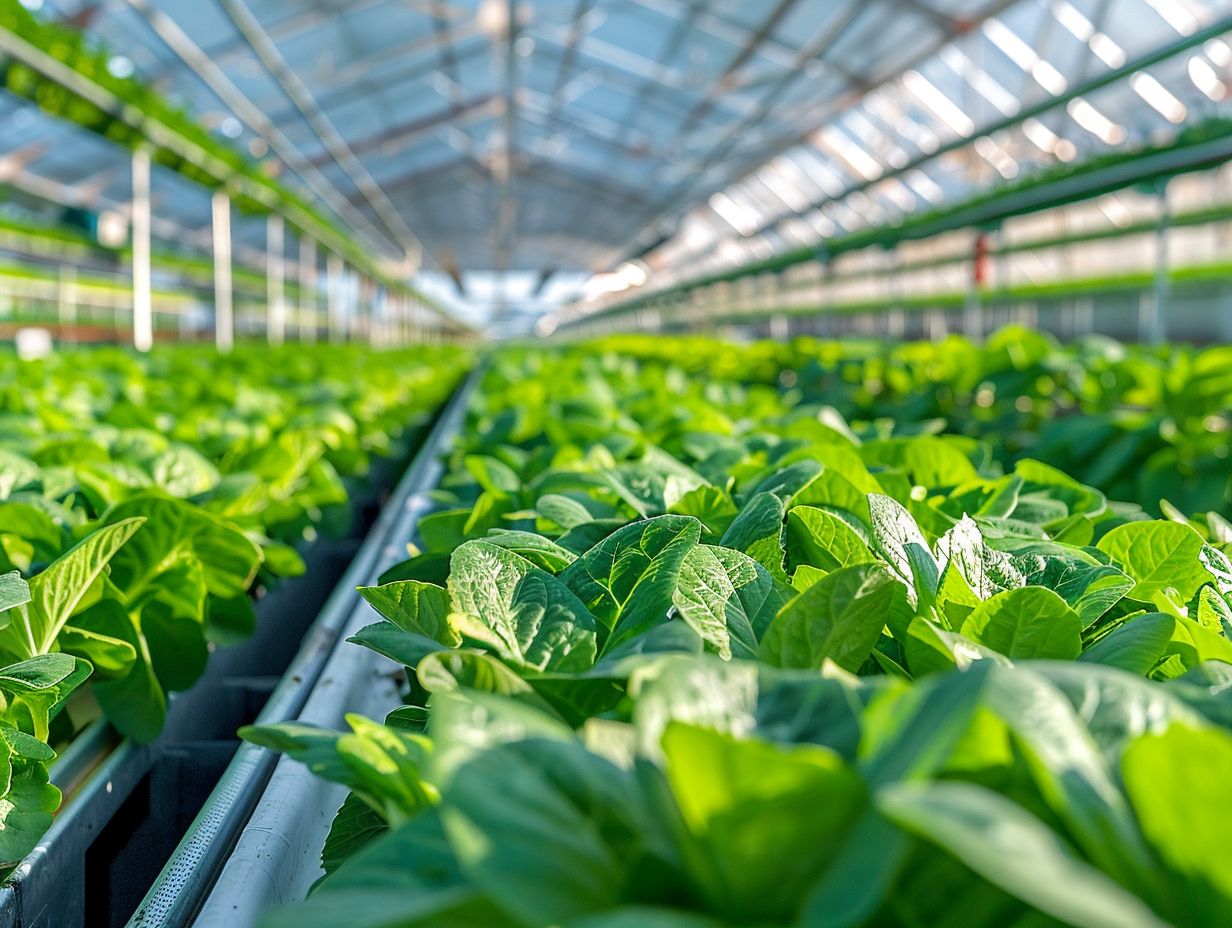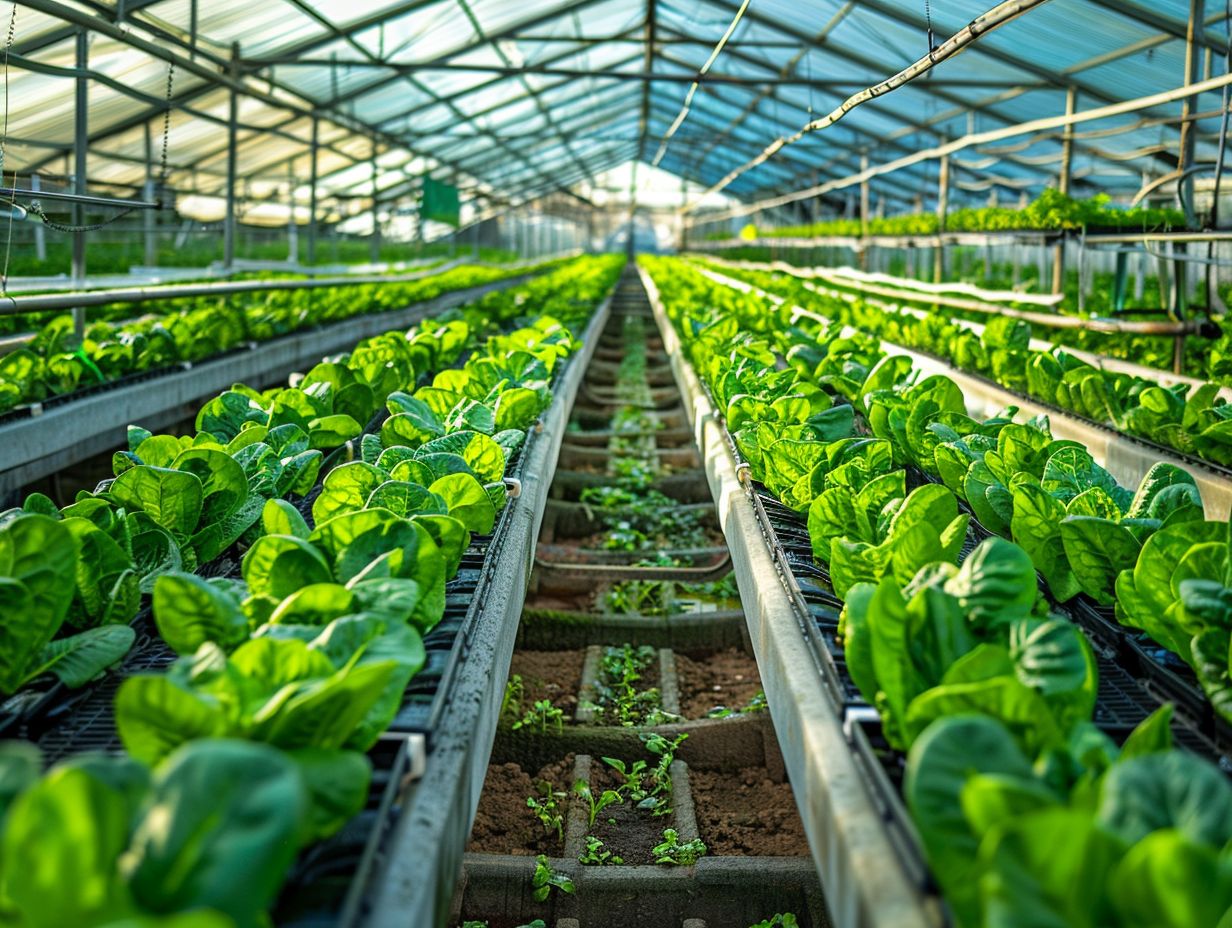Hydroponic farming, a method of growing plants without soil, has been gaining popularity in South Africa. This article explores the ins and outs of hydroponic farming, from how it works and the types of crops that can be grown, to the benefits and challenges of this innovative farming technique.
We will also discuss the most profitable crops for hydroponic farming in South Africa and provide steps on how to start your own hydroponic farm. So, is hydroponic farming profitable in South Africa? Let’s find out.
Key Takeaways:

What is Hydroponic Farming?
Hydroponic farming is a method of growing plants without soil, using water and nutrient solutions instead. In South Africa, hydroponics is gaining popularity as an innovative approach to commercial farming, offering an alternative to traditional soil-based cultivation.
This method involves cultivating plants in nutrient-rich water-based solutions, providing essential nutrients directly to the plant roots. One significant advantage of hydroponic farming is its efficient use of water, which is especially crucial in regions facing water scarcity, like certain parts of South Africa. Unlike conventional farming, hydroponics eliminates the need for large plots of land, making it suitable for urban areas with limited space.
Hydroponic systems offer greater control over growing conditions, such as temperature and pH levels, leading to higher crop yields in a controlled environment. This high level of control also reduces the risk of pests and diseases that commonly affect traditional soil-based crops, resulting in reduced pesticide usage and healthier produce.
How Does Hydroponic Farming Work?
Hydroponic farming works by providing plants with water, nutrients, and oxygen in a controlled environment without the use of soil. This method is particularly suitable for urban areas and vertical farming setups where space is limited.
Water in hydroponic systems acts as the medium to deliver essential nutrients directly to the plant roots. By carefully managing the water levels and nutrient concentrations, growers can optimize plant growth and health. The controlled environment in hydroponics allows for precise regulation of temperature, humidity, and light, creating ideal conditions for plants to thrive. This method of farming also reduces the risk of soil-borne diseases, providing a cleaner and more efficient way to cultivate crops.
What Types of Crops Can Be Grown with Hydroponic Farming?
Various types of crops can be grown using hydroponic farming, including leafy greens like lettuce and herbs. In South Africa, hydroponic cultivation is especially popular for producing high-quality lettuces.
A wide range of herbs such as basil, mint, and cilantro thrive in hydroponic systems due to their resilience and high demand in local markets. The controlled environment of hydroponics allows these crops to grow faster and more efficiently, resulting in a consistent supply throughout the year.
- The versatility of hydroponic farming in South Africa extends beyond lettuce and herbs to include other crops like tomatoes, cucumbers, and strawberries.
- The technology used in hydroponics ensures optimal nutrient uptake and water conservation, making it a sustainable solution for the region’s agricultural needs.
What Are the Most Profitable Crops for Hydroponic Farming in South Africa?
In South Africa, some of the most profitable crops for hydroponic farming include high-demand leafy greens like lettuce, which are sought after by customers for their freshness and quality.
These high-demand varieties of lettuce are not only popular among consumers for their taste and nutritional value but also offer significant returns to hydroponic farmers due to their fast growth rates and consistent market demand.
When comparing the profitability of different crops, lettuce stands out as a lucrative option due to its short harvest cycle, high yield per square meter, and ability to fetch premium prices in the market.
What Are the Benefits of Hydroponic Farming?
Hydroponic farming offers numerous benefits, including higher yields, faster plant growth, and efficient use of resources. Growers can optimize production in controlled environments such as greenhouses, with specialized equipment for nutrient delivery.
One of the key advantages of hydroponic farming is its ability to significantly increase yield production compared to traditional soil-based methods. Since plants receive all necessary nutrients directly through water, their growth rates are accelerated, resulting in quicker harvest cycles. The precise control over nutrient levels, light exposure, and environmental factors allows for maximum efficiency in resource utilization, minimizing waste and enhancing sustainability. Greenhouse setups further bolster these advantages by providing a controlled, disease-free environment that protects crops from adverse weather conditions, pests, and other external threats.
Efficient Use of Space and Resources
One key benefit of hydroponic farming is the efficient use of space and resources, as plants receive precisely the water, nutrients, and growth conditions they need, minimizing wastage and maximizing output.
Hydroponic systems are designed to deliver water and nutrients directly to the plant roots, eliminating soil as a medium. This targeted delivery approach ensures that plants can uptake nutrients more efficiently, leading to faster growth rates and higher yields.
By controlling the environment, hydroponic farming maximizes resource utilization by reducing water usage compared to traditional soil-based methods. The ability to adjust nutrient levels in real-time allows for optimal plant development, resulting in healthier and more vibrant crops.
Higher Yields and Faster Growth
 Another significant benefit of hydroponic farming is the potential for higher yields and faster plant growth compared to traditional methods, leading to increased profits for growers.
Another significant benefit of hydroponic farming is the potential for higher yields and faster plant growth compared to traditional methods, leading to increased profits for growers.
Hydroponic farming allows growers to have better control over the environment in which their crops grow, resulting in optimal conditions for plant development. The absence of soil in hydroponic systems also eliminates the risk of soil-borne diseases, reducing the need for chemical pesticides and fertilizers.
The efficient use of water in hydroponics, with the ability to recirculate and reuse it within the system, makes this method more sustainable and cost-effective in the long run. This not only benefits the environment but also contributes to the economic viability of the farm operation.
Less Water Usage and Environmental Impact
Hydroponic farming requires less water usage compared to traditional soil-based agriculture, reducing environmental impact through efficient nutrient delivery systems and water recycling practices.
By utilizing a closed-loop system, hydroponic farms can recycle and reuse water, preventing the wastage associated with conventional farming methods. This closed system minimizes the need for continuous irrigation and ensures that nutrient-rich water is efficiently utilized by the crops. Additionally, sustainable nutrient management techniques such as nutrient film technique (NFT) and drip irrigation further enhance water efficiency by delivering nutrients directly to the plant roots, eliminating nutrient leaching and runoff. These practices not only save water but also promote a more environmentally sustainable approach to agriculture.
What Are the Challenges of Hydroponic Farming in South Africa?
While hydroponic farming offers many benefits, it also comes with challenges in South Africa, such as effective management of nutrient solutions, maintaining optimal temperatures, and ensuring system efficiency.
Managing nutrient solutions in hydroponic systems is crucial for plant growth and development. South African hydroponic farmers face unique challenges in finding the right balance of nutrients to ensure healthy crops. Issues such as fluctuating temperatures can also pose a threat to crop production, requiring careful monitoring and control mechanisms.
Operational efficiency plays a vital role in the success of hydroponic farms in the region. From water usage to energy consumption, every aspect needs to be optimized to maximize output while minimizing costs.
High Start-up Costs
One of the primary challenges of hydroponic farming is the high start-up costs involved in setting up the infrastructure, equipment, and systems, which can pose risks for potential investors.
Starting a hydroponic farm requires a significant initial investment in specialized equipment such as grow lights, pumps, nutrient solutions, and monitoring systems. The development of a controlled environment, including climate control systems and hydroponic growing beds, adds to the financial burden. These capital-intensive requirements can deter investors who are not prepared for the substantial upfront costs and ongoing operational expenses.
Technical Knowledge and Skills Required
Successful hydroponic farming in South Africa demands technical knowledge and specialized skills in nutrient management, system operations, and pest control solutions, presenting a learning curve for growers.
Developing proficiency in these areas is crucial for farmers aiming to optimize crop production and achieve sustainable yields. Utilizing advanced technology for precise nutrient delivery and monitoring system performance can significantly enhance efficiency and reduce risks of nutrient imbalances.
- Training programs focused on skill development play a vital role in give the power toing growers with the expertise needed to address common challenges in hydroponic farming.
- Effective pest control strategies, such as implementing integrated pest management practices, are essential to safeguard crops from diseases and pests without compromising the environment.
Staying updated on the latest trends in hydroponic farming and adopting innovative solutions for crop cultivation can lead to increased productivity and profitability. Investing time and resources in continuous learning and adaptability is key to overcoming obstacles and ensuring success in the dynamic agricultural landscape.
Potential Pest and Disease Issues
Hydroponic farming in South Africa faces potential pest and disease challenges due to the controlled environment that can create favorable conditions for pests, emphasizing the need for climate monitoring and proactive pest management strategies.
Due to the year-round cultivation provided by hydroponic systems, pests can establish themselves more rapidly if left unchecked, potentially leading to severe crop damage and economic losses. Integrating beneficial insects into the environment is a natural and eco-friendly approach to controlling pests, reducing the reliance on chemical pesticides which can harm the ecosystem. The vulnerability of hydroponic crops to diseases is heightened in temperature-controlled environments, necessitating strict hygiene protocols and disease monitoring to prevent outbreaks. Understanding the relationship between climate conditions and pest prevalence is crucial in developing targeted and effective pest control strategies.
How Can Hydroponic Farming Be Profitable in South Africa?
To make hydroponic farming profitable in South Africa, farmers need to employ techniques that target high-demand crops, cater to local customers, and diversify their crop varieties to maximize profitability.
One crucial strategy for successful hydroponic farming in South Africa is implementing a customer-centric approach. By understanding the local market needs and preferences, farmers can tailor their crop selection to meet the demands, thus ensuring a consistent customer base and steady revenue stream.
Additionally, crop diversification plays a key role in spreading risks and increasing yields. By cultivating a variety of crops, farmers can capitalize on changing market trends and reduce vulnerability to crop-specific challenges.
Employing effective cultivation techniques such as optimizing nutrient solutions, controlling environmental conditions, and monitoring plant health is essential for maximizing productivity and quality.”
Targeting High-Demand Crops
 One key strategy for profitability in hydroponic farming is targeting high-demand crops such as lettuces that have a consistent market demand and appeal to local clients, ensuring a steady revenue stream for farmers.
One key strategy for profitability in hydroponic farming is targeting high-demand crops such as lettuces that have a consistent market demand and appeal to local clients, ensuring a steady revenue stream for farmers.
By analyzing market trends and understanding customer preferences, hydroponic farmers can make informed decisions on crop selection. Lettuces stand out as a popular choice due to their versatility, nutritional value, and quick growth cycle, making them a lucrative option for farmers looking to capture market opportunities. Focusing on high-demand crops like lettuces not only ensures a stable income but also helps in building a loyal clientele base, establishing a strong presence in the market.
Selling to Local Markets
Selling produce to local markets can increase profits for hydroponic farmers in South Africa, as establishing partnerships with packing sheds and engaging with local communities can create a loyal customer base and support family-run operations.
When hydroponic farmers sell their produce locally, they not only enhance their profits but also play a vital role in boosting the economy of their region. By utilizing packing sheds for efficient distribution and packaging, farmers can ensure that their products reach consumers fresh and intact, thus increasing customer satisfaction. Involving family members in the farming and selling processes fosters a sense of unity and commitment, leading to a stronger operation overall. The connection built with the local community through these practices helps in building trust, growing brand recognition, and ensuring long-term sustainability of the business.
Holding events or workshops to educate the community about hydroponic farming techniques can further strengthen the bond between farmers and consumers, encouraging repeat sales and word-of-mouth referrals.
Diversifying with Different Crops
Diversifying crop varieties through different cultivation techniques can boost profits in hydroponic farming, as it allows farmers to cater to diverse market demands, mitigate risks, and capitalize on seasonal trends.
By incorporating a mix of crops, hydroponic farmers can spread out their risks. If one crop underperforms due to unexpected factors like weather conditions or market fluctuations, the overall impact on profits is minimized. This risk management aspect is crucial in ensuring a stable income stream for the farmers.
Crop diversification enables farmers to adapt quickly to changing market preferences. For instance, if there is a surge in demand for a particular crop due to a health trend or a special event, having a diversified range of crops allows farmers to respond promptly and take advantage of these market opportunities.
What Are the Steps to Starting a Hydroponic Farm in South Africa?
Starting a hydroponic farm in South Africa involves several key steps, including thorough research and planning, acquiring the necessary equipment, setting up the system, monitoring operations, and effectively marketing the produce for success in the agricultural technology sector.
One of the fundamental aspects of establishing a successful hydroponic farm lies in identifying the ideal location that receives ample sunlight and has access to water sources.
Next, carefully selecting the right crops to cultivate based on market demand and climate conditions is crucial for ensuring a profitable venture.
Implementing advanced technology such as automated nutrient delivery systems and climate control mechanisms can optimize plant growth and minimize resource wastage.
Regular monitoring of factors like pH levels, nutrient concentrations, and temperature is essential to maintain optimal growing conditions and maximize yields.
Research and Planning
Researching and planning are crucial initial steps when starting a hydroponic farm, involving assessments of water quality, nutrient solutions, suitable crops, and market demand to lay a strong foundation for a successful operation.
Water quality is a key factor in hydroponic systems, as it directly impacts plant growth and overall success. Conducting thorough research on the source and composition of the water is imperative to ensure that it meets the needs of the chosen crops.
Similarly, selecting appropriate nutrient solutions tailored to the specific requirements of the crops being grown is essential. It involves understanding the nutrient balance needed for optimal growth and productivity.
Careful consideration of crop selection is vital to achieve desired yields and profitability in hydroponic farming. Factors such as growth rate, nutrient uptake, and market value should all be taken into account when deciding which crops to cultivate.
Acquiring Necessary Equipment and Materials
Acquiring the required equipment and materials, such as hydroponic systems, nutrient delivery mechanisms, and water management tools, is essential for setting up a functional and efficient hydroponic farm in South Africa.
In terms of choosing the right hydroponic system, considerations should be made regarding the farm’s size, the types of plants to be grown, and the budget available. Common systems like Deep Water Culture (DWC), Nutrient Film Technique (NFT), and Ebb and Flow are popular choices. Investing in precise water management tools such as pH meters, electrical conductivity (EC) meters, and water pumps is crucial for maintaining the nutrient solution at optimal levels.
Using nutrient delivery equipment like dosing pumps, nutrient reservoirs, and drip irrigation systems helps in ensuring that plants receive the essential nutrients efficiently. Remember, the success of a hydroponic farm relies heavily on the proper selection and implementation of these equipment and materials.
Setting Up the System
Setting up the hydroponic system involves configuring the nutrient delivery system, temperature controls, and monitoring mechanisms to ensure optimal plant growth while managing risks associated with system malfunctions and operational challenges.
One critical component of a hydroponic system is the nutrient delivery system, which typically includes a reservoir, pump, and tubing to circulate the nutrient solution to the plant roots. This setup ensures that plants receive the necessary nutrients for healthy development. Temperature control is essential to regulate the environment for optimal plant growth. Maintaining appropriate temperature levels can prevent stress on plants and ensure efficient nutrient uptake. Monitoring mechanisms such as pH meters and nutrient sensors help in assessing the system’s performance and making adjustments to avoid potential issues.
Monitoring and Maintenance
 Continuous monitoring and maintenance are essential tasks in hydroponic farming to address climate fluctuations, pest challenges, and system malfunctions, ensuring crop health, sustainability, and maximizing profits.
Continuous monitoring and maintenance are essential tasks in hydroponic farming to address climate fluctuations, pest challenges, and system malfunctions, ensuring crop health, sustainability, and maximizing profits.
Effective management of climate variations is crucial to provide the optimal growing conditions for hydroponic crops, with variations in temperature, humidity, and light levels directly impacting plant growth and yield.
Keeping a careful eye on potential pest threats is imperative in preventing infestations that can quickly spread, affecting the entire crop. Regular checks and timely interventions using integrated pest management strategies are key to safeguarding the plants.
Addressing operational challenges such as nutrient deficiencies, clogging in irrigation systems, or electrical issues is essential to maintain the smooth functioning of the hydroponic setup. Timely upkeep and repairs can prevent costly downtime and minimize crop losses.
Marketing and Selling the Produce
Effective marketing strategies are crucial for hydroponic farmers to reach target markets, engage with clients, and leverage technology platforms for promoting and selling their produce, ensuring business growth and customer satisfaction.
Marketing and sales efforts play a vital role in the success of hydroponic farming operations. By implementing innovative marketing techniques such as social media campaigns, influencer partnerships, and targeted advertising, farmers can increase their market penetration and attract new customers.
Cultivating strong client relations through personalized interactions, customer feedback mechanisms, and loyalty programs helps in retaining existing customers and building a loyal customer base.
Frequently Asked Questions
Is hydroponic farming profitable in South Africa?
Yes, hydroponic farming can be profitable in South Africa, depending on various factors such as the type of crops grown, market demand, and efficient management practices.
What are the main advantages of hydroponic farming in South Africa?
Hydroponic farming in South Africa offers several advantages, including higher crop yields, faster growth rates, reduced water usage, and the ability to grow crops in areas with limited land availability.
Are there any challenges to consider when starting a hydroponic farm in South Africa?
Some challenges to consider when starting a hydroponic farm in South Africa include initial capital investment, access to reliable electricity and water supply, and obtaining proper permits and licenses.
Which types of crops are most profitable to grow using hydroponic farming in South Africa?
High-value crops like lettuce, tomatoes, cucumbers, and herbs are generally more profitable to grow using hydroponic farming in South Africa due to their high demand and limited availability in the local market.
Are there any government incentives or support for hydroponic farming in South Africa?
Yes, the South African government offers various incentives and support programs for hydroponic farming, such as financial assistance, training and development programs, and access to markets.
Can hydroponic farming be sustainable in South Africa?
Yes, hydroponic farming can be a sustainable agricultural method in South Africa as it minimizes the use of natural resources, reduces environmental impact, and allows for year-round production.
Leave a Reply